
FACULTY OF ARTS AND SCIENCES
Department of English Translation and Interpreting
ETI 310 | Course Introduction and Application Information
| Course Name |
Cultural Aspects of Translation and Interpretation
|
|
Code
|
Semester
|
Theory
(hour/week) |
Application/Lab
(hour/week) |
Local Credits
|
ECTS
|
|
ETI 310
|
Fall/Spring
|
3
|
0
|
3
|
6
|
| Prerequisites |
None
|
|||||
| Course Language |
English
|
|||||
| Course Type |
Elective
|
|||||
| Course Level |
First Cycle
|
|||||
| Mode of Delivery | face to face | |||||
| Teaching Methods and Techniques of the Course | DiscussionQ&ASimulation | |||||
| Course Coordinator | ||||||
| Course Lecturer(s) | ||||||
| Assistant(s) | - | |||||
| Course Objectives | The primary aim of this course is to develop an awareness of the cultural dimensions of translation and interpretation by studying texts that are rich incultural elements. |
| Learning Outcomes |
The students who succeeded in this course;
|
| Course Description | This course treats the art of translation from the dual perspectives of theory and practice. We shall look at various theoretical issues that impact on the choices translators make, and spend much of class time practicing various translation strategies and honoring particular techniques. |
|
|
Core Courses | |
| Major Area Courses | ||
| Supportive Courses | ||
| Media and Management Skills Courses |
X
|
|
| Transferable Skill Courses |
WEEKLY SUBJECTS AND RELATED PREPARATION STUDIES
| Week | Subjects | Related Preparation |
| 1 | Cultural Dimensions of Translation and Interpreting, Cultural Problems | |
| 2 | Strategies in Translation and Interpreting | |
| 3 | Translating/interpreting texts on food | Translation of texts from online sources |
| 4 | Translating/interpreting texts on food | Translation of texts from online sources |
| 5 | Translating/interpreting texts on food | Translation of texts from online sources |
| 6 | Translating/interpreting texts on food | Translation of texts from online sources |
| 7 | Midterm Exam | |
| 8 | Translating/interpreting texts on tourism | Translation of texts from online sources |
| 9 | Translating/interpreting texts on tourism | Translation of texts from online sources |
| 10 | Translating/interpreting texts on tourism | Translation of texts from online sources |
| 11 | Translating/interpreting literary texts | Translation of texts from online sources |
| 12 | Translating/interpreting literary texts | Translation of texts from online sources |
| 13 | Translating/interpreting media texts -Interpreting Award Ceremonies | Pöchhacker, F. (2011), Researching TV interpreting: selected studies of US presidential material. The Interpreters' Newsletter, 16, 21-36. http://hdl.handle.net/10077/8252 |
| 14 | Interpreting talk shows | Straniero Sergio, F. (1999). The Interpreter on the (Talk) Show, The Translator, 5:2, 303-326 Amelia A., Gabriele M., (2011), Interpreting the Oscar Night on Italian TV: an interpreters’ nightmare? The Interpreters' Newsletter, 16, 37-60. http://hdl.handle.net/10077/8252 |
| 15 | Semester Review | - |
| 16 | Final Exam | - |
| Course Notes/Textbooks | |
| Suggested Readings/Materials | Pöchhacker, F. (2011), Researching TV interpreting: selected studies of US presidential material. The Interpreters' Newsletter, 16, 21-36. http://hdl.handle.net/10077/8252 Straniero Sergio, F. (1999). The Interpreter on the (Talk) Show, The Translator, 5:2, 303-326 Amelia A., Gabriele M., (2011), Interpreting the Oscar Night on Italian TV: an interpreters’ nightmare? The Interpreters' Newsletter, 16, 37-60. http://hdl.handle.net/10077/8252 |
EVALUATION SYSTEM
| Semester Activities | Number | Weigthing |
| Participation |
1
|
15
|
| Laboratory / Application | ||
| Field Work | ||
| Quizzes / Studio Critiques | ||
| Portfolio | ||
| Homework / Assignments |
1
|
15
|
| Presentation / Jury | ||
| Project | ||
| Seminar / Workshop | ||
| Oral Exams | ||
| Midterm |
1
|
30
|
| Final Exam |
1
|
40
|
| Total |
| Weighting of Semester Activities on the Final Grade |
3
|
60
|
| Weighting of End-of-Semester Activities on the Final Grade |
1
|
40
|
| Total |
ECTS / WORKLOAD TABLE
| Semester Activities | Number | Duration (Hours) | Workload |
|---|---|---|---|
| Theoretical Course Hours (Including exam week: 16 x total hours) |
16
|
3
|
48
|
| Laboratory / Application Hours (Including exam week: '.16.' x total hours) |
16
|
0
|
|
| Study Hours Out of Class |
14
|
3
|
42
|
| Field Work |
0
|
||
| Quizzes / Studio Critiques |
0
|
||
| Portfolio |
0
|
||
| Homework / Assignments |
1
|
24
|
24
|
| Presentation / Jury |
0
|
||
| Project |
0
|
||
| Seminar / Workshop |
0
|
||
| Oral Exam |
0
|
||
| Midterms |
1
|
30
|
30
|
| Final Exam |
1
|
36
|
36
|
| Total |
180
|
COURSE LEARNING OUTCOMES AND PROGRAM QUALIFICATIONS RELATIONSHIP
|
#
|
Program Competencies/Outcomes |
* Contribution Level
|
||||
|
1
|
2
|
3
|
4
|
5
|
||
| 1 | To be able to use advanced, field-specific conceptual, theoretical, and practical knowledge acquired, |
X | ||||
| 2 | To be able to analyze and research field-specific concepts and ideas and to interpret data individually or as a team using scientific methods, |
X | ||||
| 3 | To be able to understand and use grammatical and semantic structures of the source and target languages, |
|||||
| 4 | To be able to obtain information about social, cultural, and historical approaches within the source and target languages and to use this information for textual analysis and production, |
X | ||||
| 5 | To be able to understand and interpret written and oral texts in the source language and to transfer these texts into the target language using a semantically and functionally appropriate language, |
|||||
| 6 | To be able to produce creative translations and assess the translation products critically by defining the steps, strategies and problems in the translation process in the light of field-specific theoretical knowledge and skills acquired, |
X | ||||
| 7 | To be able to transfer the theoretical knowledge and research skills within different areas of expertise to translational act, |
|||||
| 8 | To be able to use computer-assisted translation tools and machine translation effectively at each step of the translation process, and to follow the theoretical and practical developments in these fields, |
|||||
| 9 | To be able to gain awareness of the translator’s social role, job profile, and professional ethical values and to acquire workload management skills for individual or team work, |
|||||
| 10 | To be able to access necessary sources to improve quality at each step of the translation process and to assess the target text in accordance with the quality objectives by using these sources, |
|||||
| 11 | To be able to establish effective oral and written communication skills both in English and Turkish, to be able to speak a second foreign language at a good level, to be able to use a third foreign language at intermediate level, |
|||||
| 12 | To be able to relate the knowledge accumulated throughout the human history to their field of expertise. |
X | ||||
*1 Lowest, 2 Low, 3 Average, 4 High, 5 Highest
NEWS |ALL NEWS
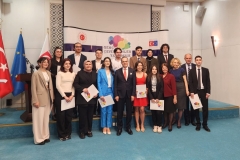
Young Translators from İzmir University of Economics Received Their Awards.
On April 16, 2024, in Ankara, the Directorate for EU Affairs hosted the Certificate Ceremony for the "Young Translators Competition," where 125
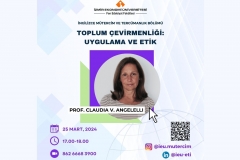
IUE Department of English Translation and Interpreting hosted Prof. Dr. Claudia V. Angelelli in the webinar titled "Community Interpreting: Practice and Ethics".
On Monday, March 25th, İzmir University of Economics Department of English Translation and Interpretation organized a webinar titled "Community Interpreting: Practice and
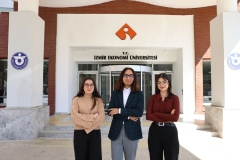
Returned to Izmir with three awards
The Young Translators Competition organized by the Ministry of Foreign Affairs Directorate for EU Affairs was marked by the success of Izmir
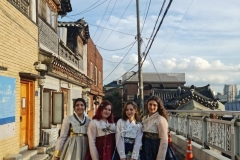
International agreements with 203 universities
Izmir University of Economics (IUE), who has signed international agreements with 203 universities with the aim of enhancing the educational opportunities offered
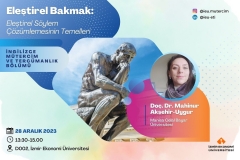
“Basics of Critical Discourse Analysis" Seminar at IUE English Translation and Interpreting Department
Izmir University of Economics, Department of English Translation and Interpreting, organized a seminar titled " Turning a Critical Eye: Basics of Critical
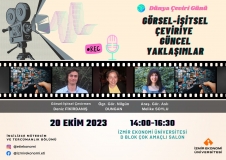
Within the framework of International Translation Day, IUE Department of English Translation and Interpreting, Faculty of Arts and Sciences, organized a panel titled "Current Approaches in Audiovisual Translation".
Within the framework of International Translation Day (September 30th), the Department of English Translation and Interpreting at Izmir University of Economics hosted
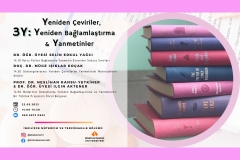
“Re-translations, Re-contextualization, and Paratexts” Panel at IUE English Translation and Interpreting Department
Izmir University of Economics, Faculty of Arts and Sciences, Department of English Translation and Interpreting organized an online panel titled "Re-translations, Re-contextualization,
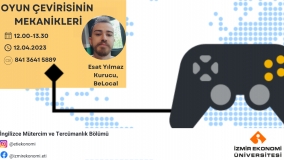
As part of the webinar series, IUE Department of English Translation and Interpreting, Faculty of Arts and Sciences, hosted Esat Yılmaz
IUE Department of English Translation and Interpreting, Faculty of Arts and Sciences, hosted Esat Yılmaz, the founder of a localization company, in



